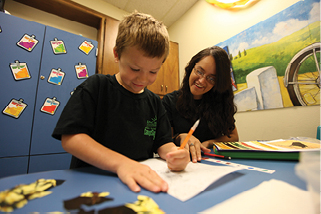Anonymous gift supports work of Communication Sciences and Disorders
In July, Baylor announced a gift of $10 million to the department of communication sciences and disorders that will transform its students’ educational experience, expand its service to those with speech-language needs in Texas and position the department for national impact as a leader in the field of speech language pathology.
Made by Baylor alumni who wish to remain anonymous, the transformational gift will be used to enhance leadership, program and faculty development; extend funding for research, collaborations and community engagement; and significantly expand the capacity of the graduate program.
"Through this truly transformational gift, these generous and forward-looking champions of Baylor have given the department of communication sciences and disorders the means to realize many long-held dreams," Baylor President and Chancellor Ken Starr said. "While these remarkable alumni have chosen to remain anonymous, the power of their gift will be well known and appreciated throughout the State of Texas and the nation as the department grows in stature and its graduates go out into the world to provide exceptional professional service to those in need."
For more than a half-century, Baylor's Department of Communication Sciences and Disorders (CSD) has lived out the institution's mission through the teaching and scholarship of its faculty and the careers of its alumni. As a component of Baylor's Robbins College of Health and Human Sciences, the department encompasses the areas of speech language pathology, audiology and deaf education and has graduated more than 1,200 speech-language pathologists who provide treatments to more than 60,000 speech-, language- and hearing-disabled children and adults every week in America.
The gift will fund a wide variety of growth-oriented initiatives within the department, including the creation of an endowed chair that will enable Baylor to attract a prominent scholar and visionary to direct the program's growth. An endowed fund also has been established for the department, providing the capacity to expand its graduate program by modernizing clinical facilities, creating new faculty positions and upgrading technology.
The gift's most immediate and visible effect will be the relocation of the department of communication sciences and disorders from Neill Morris Hall to the Cashion Academic Building, which will be renovated for the program's needs. Approximately 18,000 square feet on the building's first floor will provide space for clinical work, while classroom and lab space will be made available on another floor. Faculty offices will be located in the adjoining Hankamer Building.
"There is very high demand for skilled healthcare professionals with expertise in communication sciences and disorders. The need for superior research and scholarship in disorders of the ear and brain that impact speech, understanding and hearing has never been greater," said Edwin Trevathan, executive vice president and provost. "Baylor's Department of Communication Sciences and Disorders exemplifies Baylor's Christian commitment to preparing the next generation of healthcare leaders, serving those who are in need and creating new knowledge that benefits humanity."
On the local level, the Baylor Speech and Hearing Clinic, a professional clinical division of the department, provides more than 10,000 hours of community service each year to speech-language and hearing-impaired children and adults of all ages. The clinic's new location in Cashion will provide more functional space and easier public access.
Through the department's annual Camp Success, a free intensive literacy and language program for children diagnosed with language and reading disorders, Baylor students and faculty members have assisted approximately 1,000 participants who receive 50 hours of one-on-one therapy--equivalent to a full year's worth of work in many school districts. Participants generally see dramatic improvement due to the attention and guidance of Baylor undergraduate and graduate students and faculty. The Baylor students, in return, receive outstanding experience as they prepare for full-time positions in the field.
"Camp Success is just one example of the potentially life-changing work our department provides to individuals both in the community surrounding Baylor and across the globe through the excellent work of our graduates," said Michaela Ritter, Ed.D., interim chair and associate professor of communications sciences and disorders. "This $10 million gift will allow the department to make an even greater difference in the lives of children and adults with communication disorders by supporting the daily efforts of our faculty to provide undergraduate and graduate students a comprehensive and intensive training program that incorporates the latest innovations and research, state-of- the-art technology and clinical experience in a wide variety of settings."
